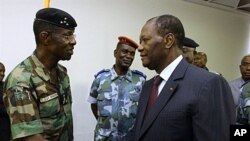French and Ivorian forces are patrolling the streets of Ivory Coast's main city, working to restore security in Abidjan after four months of post-election violence.
Former president Laurent Gbagbo's army chief, General Philippe Mangou, is ordering soldiers to return to work under the new government of President Alassane Ouattara.
Mangou says forces must swear allegiance to their new leader, who has ordered them to help secure Abidjan and the interior of the country.
Several of Gbagbo's top army officials swore loyalty to Ouattara on Tuesday, a day after forces captured the former leader and ended his struggle to remain in power.
The United Nations said Gbagbo and his wife, Simone, were taken to the Golf Hotel in Abidjan and held under U.N. protection.
Ouattara has dismissed speculation that Gbagbo would be sent to the International Criminal Court in The Hague. He said those who have been arrested "will receive dignified treatment and their rights will be respected."
French Defense Minister Gerard Longuet said Wednesday France will soon withdraw about 800 of its 1,700 troops now deployed in Ivory Coast.
Abidjan saw sporadic looting and heavy weapons fire Tuesday as pro-Ouattara forces worked to round up members of Gbagbo's militant youth wing, particularly its leader Charles Ble Goude.
Ouattara has called on all fighters to lay down their weapons following Gbagbo's capture Monday.
In a national address Monday night, Ouattara called for peace after months of post-election violence killed hundreds of people and displaced up to one million.
The U.N. human rights office said Tuesday that at least 536 people were killed in recent fighting in western Ivory Coast.
Ouattara has vowed to set up a truth and reconciliation commission to hold accountable those who committed human rights abuses and other crimes.
Pro-Gbagbo forces and fighters loyal to Ouattara have both been accused of killing and raping civilians since the political crisis began in December.
Gbagbo had been president of Ivory Coast since being named the winner of the disputed 2000 election. He survived a 2002 civil war that split the country into rebel- and government-controlled areas.
Gbagbo then stayed in power more than five years past his mandate, as elections were repeatedly postponed.
Some information for this report was provided by AFP and Reuters.




